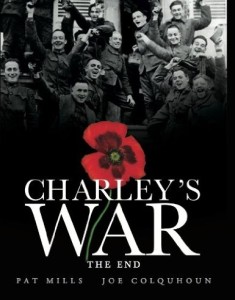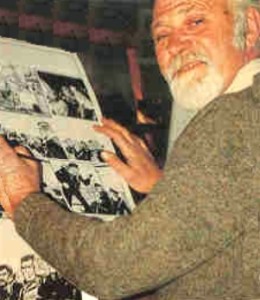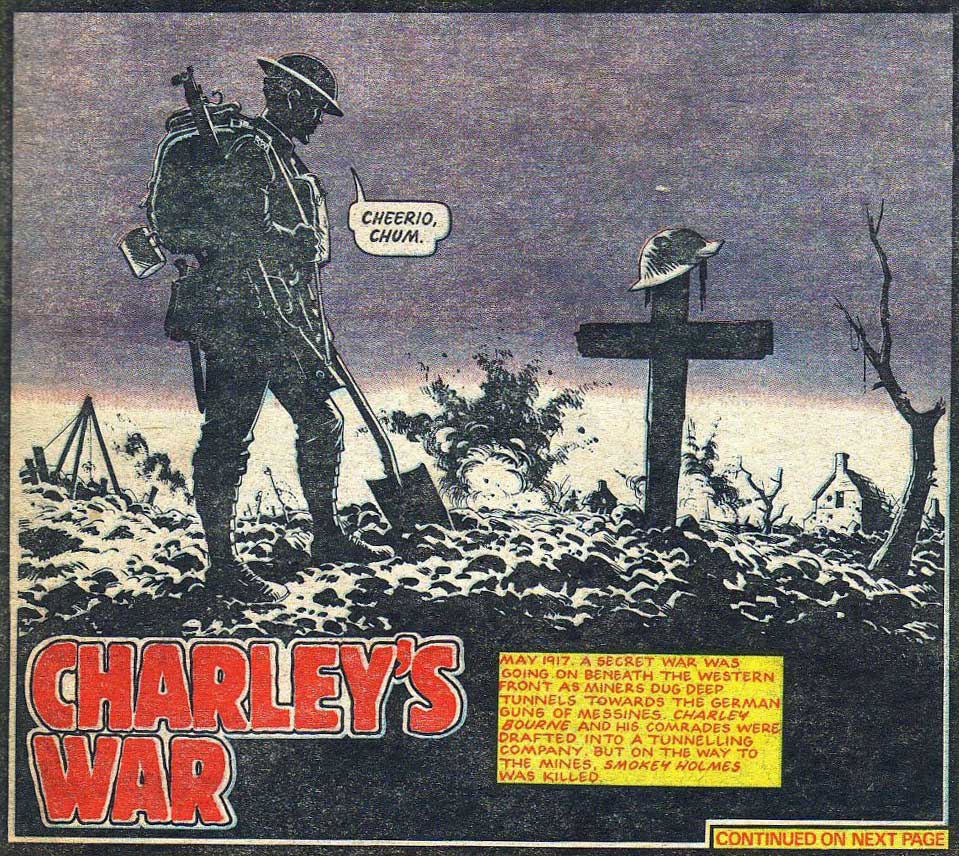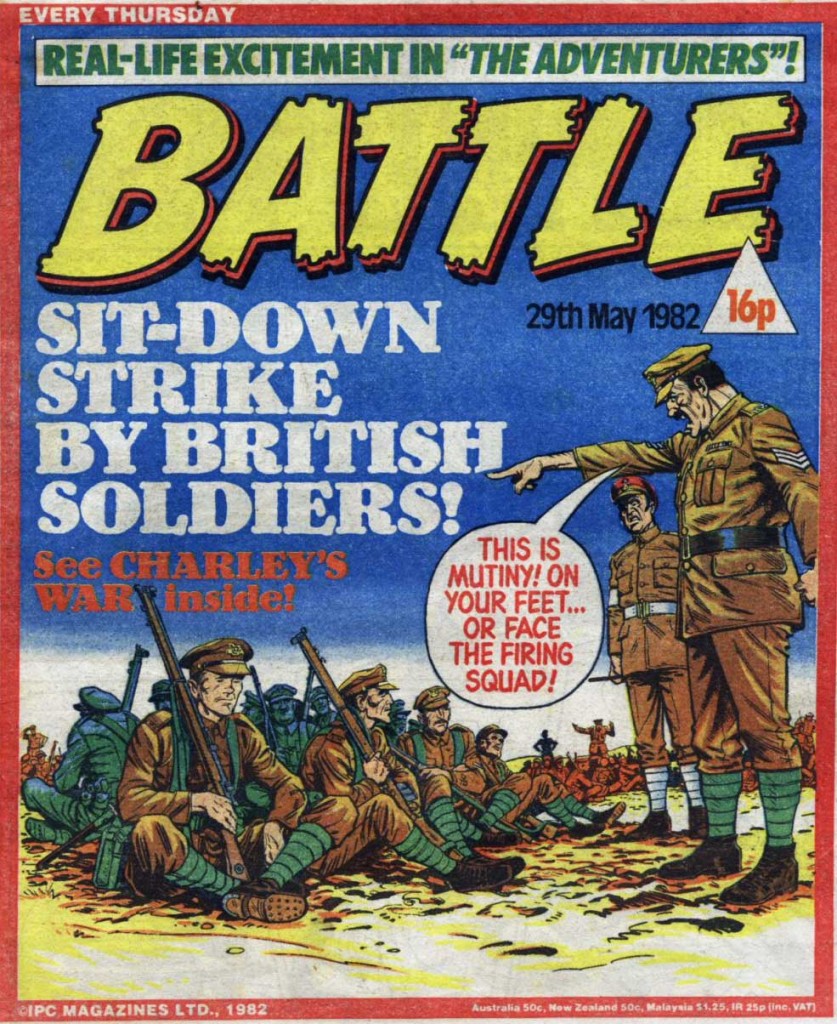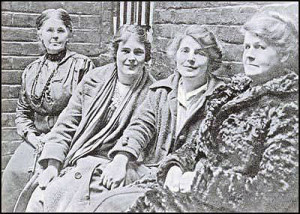If you’ve read a British comic book in the last few decades, the chances are you’ve read a story written or edited by Pat Mills. Learning his craft with DC Thomson in Dundee, Pat would go on to create Battle Picture Weekly (later, just Battle), 2000AD, Action and Diceman (a role-playing comic several years ahead of it’s time, it would have been perfect for the mobile phone era).
For many of his loyal fans, Charley’s War, drawn by Joe Colquhoun – recently optioned as a TV drama, although details of this have yet to be announced – is a classic of British comics, attracting plenty of attention in this centenary year of the start of World War One.
For 2000AD, Pat has created such stories as Slaine (his iconic Celtic hero, an intelligent Conan if you will), Nemesis the Warlock, the medieval transplanted to outer space, A.B.C Warriors, the anti-war message of Charley’s War with robots, Defoe, zombies in 1666, and many more.
That would be a splendid achievement for any man, but it’s Pat’s approach to writing comics that makes him unique. In no particular order: His research is meticulous, most comic writers make the whole thing up, using whatever came before as a template, (an endless Xerox as John Carpenter once described the Hallowe’en sequels, getting more faint and meaningless with repetition), Pat puts in the hours, reads the history book, visits the locations, and talks to people). His writing comes from the heart, the characters are based on real people like you and I; no hoary silly dialogue here. Finally, he feels very passionately about what he writes about, there’s a righteous anger at stupidity, cruelty and injustice, we should all feel this way… Maybe they’d be less stupidity and injustice as a result!
Pat very kindly gave the time for me, Steve Earles, to interview him….
Steve Earles: So, Pat, “The End”, the final volume of the Charley’s War collections has been published (although Titan are to start re-publishing the whole series using all the recently discovered art by Joe Colquhoun later this year). What are your thoughts?
Pat Mills: There’s a lot of media interest in Charley’s War at the moment so this has sparked off a new series I’m developing with artist David Hitchcock – Brothers in Arms. It features a British soldier from 1914 onwards. David’s done some great artwork for an adaption of a World War One poem for another book we’ve contributed to for Macmillan, “Dead Man’s Dump” by Isaac Rosenberg, so it looks promising. That’s not available till later in the year, I’m afraid. But these projects are very labour intensive so we’ll have to see how it develops.
Certainly Brothers takes care of any withdrawal symptoms from Charley’s War!
Steve: 2014 is the centenary of the start of the Great War, which begins at least four years of being inundated with books and documentaries on the Great War. How do you feel Charley’s War fits in with all that?
Pat: It seems to have picked up media interest – documentaries etc – but have yet to see how that all works out. I think much of the centenary material will be establishment thinking, conveniently ignoring the Last Tommy’s comment that it was “organised murder”. However I read somewhere Oh! It’s a Lovely War is being remade, so there’s room for optimism and Charley’s War, of course, fits with this.
Steve: It’s a shame Joe isn’t here to see how popular Charley’s War still is…
Pat: I know. And in France, too. The French edition may even sell better than the British as it’s sparked a flurry of invitations to France. I’m just off to Angouleme comic festival to promote it.
I met Jane, Joe’s daughter and the rest of his family at a Tank Museum talk on Charley’s War a year or so ago and I believe she’s been invited to the War Museum at Meaux later this year where we should meet up again. The family have been very supportive supplying artwork.
Steve: Charley’s War: The End finishes in 1933. Can you tell is why you elected not to continue writing the story into World War 2?
Pat: I had intended to, but I needed a research budget to interview veterans in order to sustain its anti-war quality. World War 2 is much harder. The Establishment really works at it to protect its memory as a just war, which is open to debate. Anyway, I couldn’t get the extra money – more out of disinterest than for political reasons – so I left. Joe was coming up to retirement so he asked me if I minded him continuing with another writer. Of course I didn’t, but the other writer’s stories were not well received and Charley’s War in World War 2 ended soon after Dunkirk, I think.
Steve: Although the story did continue with a different writer, Joe’s artwork for those stories is well regarded. Is there any chance of that being reprinted?
Pat: I’ve suggested to Titan that the pages might feature in an Art of Joe Colquohoun collection. It’s interesting that the readers of Charley’s War felt so differently from fans who like the art. For the readers, the story as a whole was everything. It would be easy for fans to obscure the voice of Battle readers as opposed to aficionados who discovered the series much later and I’m not sure actually understand what the series is really about.
Steve: I’ve written in my Charley’s War review about the demise of the British comics industry. As someone who did so much to create that industry, what are your feelings on this? And, is there any chance of a revival?
Pat: We were always living on borrowed time. When I started Battle with John Wagner, I was told constantly that comics were all about to die and that was in the 1970s. I think myself, John and many others kept them afloat, almost artificially, and eventually external forces closed them down.
Those forces I would identify as 1) Publishers who didn’t care. 2) Popular culture writers and editors who didn’t care 3) Poor copyright rules which don’t encourage creators to care 4) Fandom that often prefers an elite or contrary approach – whether it’s American comics, North London comics, Superheroes etc – so the tail wagged the dog.
Realistically, I think any revival will be through digital, but it will be a long haul. Currently, I’d say the North London graphic novel approach is the most important even though it’s not reflected in sales.
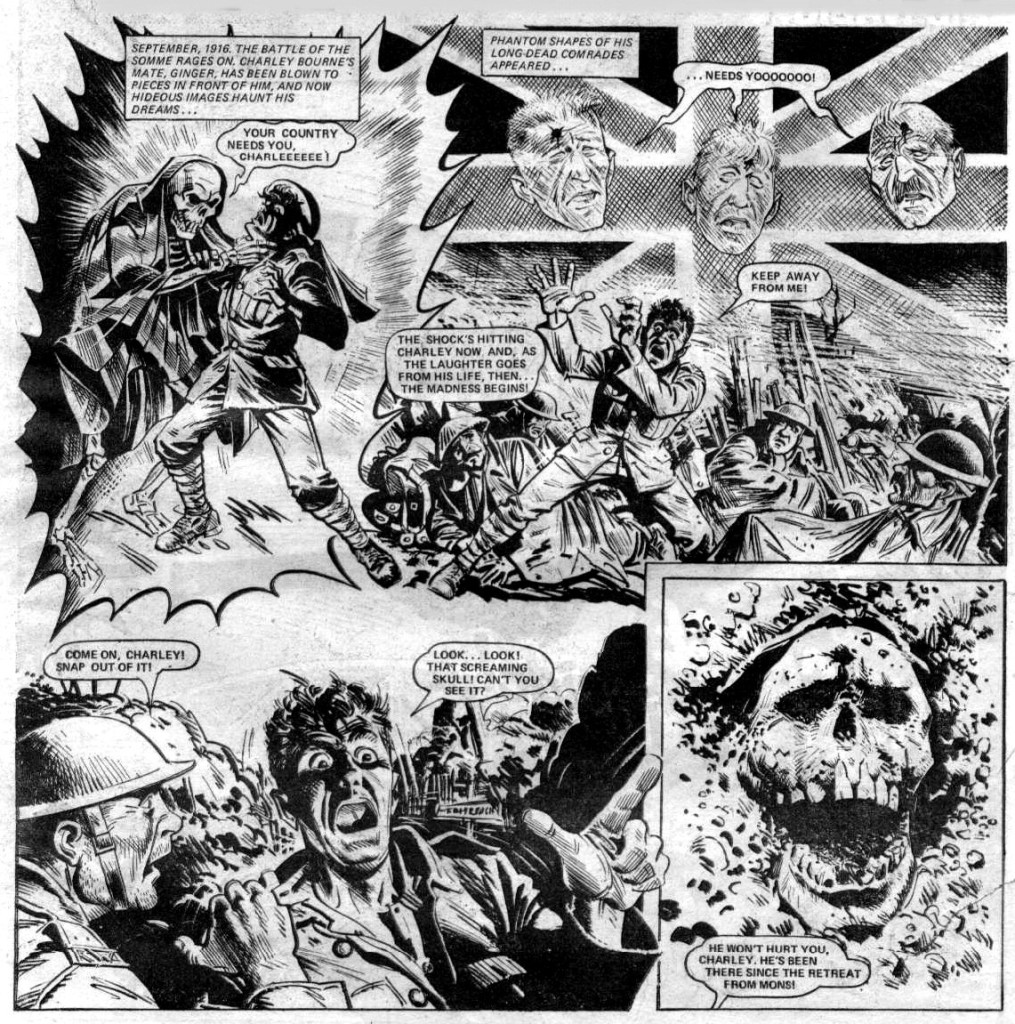
Steve: Wouldn’t Charley’s War make a very good TV series?
Pat: It has been optioned. This is part of the media interest at the moment. No details as yet, I’m afraid.
Steve: You mention in the books commentary that Battle‘s editorial interfered with your episodes with African-American soldiers?
Pat: Yes. I think they cut some stuff out because it feels a bit jagged. I remember the Battle editor, Terry Magee, said in response to a scene where white Klan members were victimising black soldiers, “We can’t have that. We don’t want to offend people.”
Amazing!
Steve: In terms of parts of the Great War Charley didn’t cover, I imagine you’d like to dramatise the Zeebrugee Raid?
Pat: I would have done. But I’d have needed a good emotional angle for it. I really wanted to do the Battle of Jutland, but the naval aspect of Charley’s War was shut down as readers didn’t like it. I think it requires enormous skill to make a ship story work in comics and lots of space. I’m not sure even now I’d have those skills, especially as I know readers don’t like any ship stories, all of which have proved a failure.
The curator of the Cartoon Museum said there was one exception: Jonah! He sank a ship every week. Readers loved that!
Steve: You understandably feel very strongly about the hidden side of the Great War. Were you ever tempted to write an actual history book on this aspect of World War One?
Pat: A little. But it would be a problem finding a publisher. I think those hidden aspects I’m now pursuing in Brothers in Arms… e.g. pacifism, Britain’s mobilisation one week before Germany invaded Belgium, trading with the enemy – which was extensive, and military sponsored use of cocaine tablets.
Even as drama, they may well put off some publishers. The 21st century is a reactionary century, nowhere near as adventurous as the last. Hence Monocled Mutineer and Black Adder. Wipers Times isn’t in the same league, in my opinion.
Steve: I feel one of the important things about Charley’s War is it shows war as it really is, rather than as something remote like a computer game?
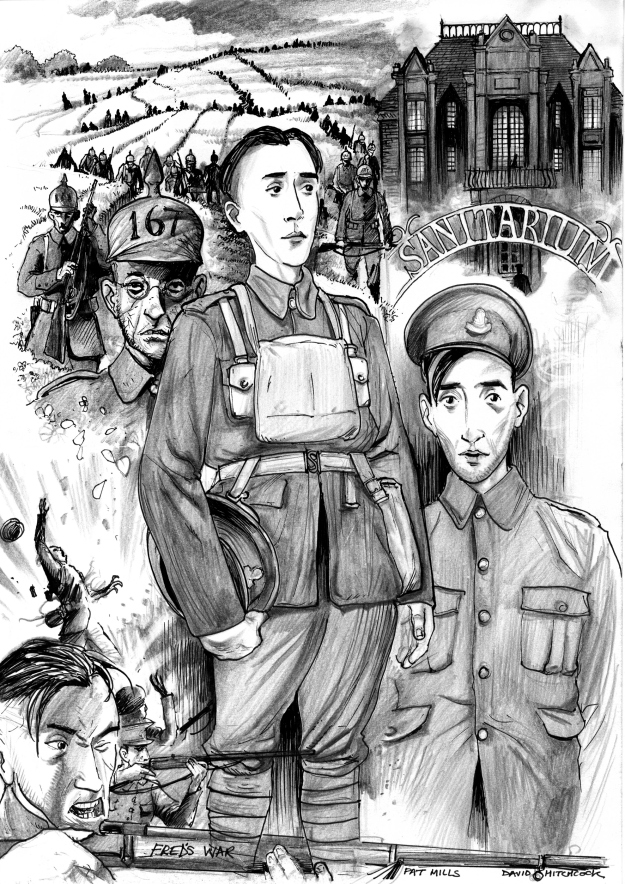
Pat: The trench warfare meant I had to write it that way. Our recent adaption of a poem “Dead Man’s Dump” by Isaac Rosenberg (a working class World War One poet) has a similar reality. David Hitchcock is a natural successor to Joe. He’s done Spring Heeled Jack and Madam Samurai in the past.
Steve: Do you feel there’s something out there against the idea of a working class hero in comics? I like your John Lennon quote in the book: ‘A working class hero is something to be.’
Pat: Yes. Definitely. Popular culture – working class appeal – has never really been valued by professionals. The exceptions were creators like Gerry Finley-Day, Kevin O’Neill, John Wagner, myself and some others. Comics are more North London now, although 2000AD still has its own unique position And Titan Books has a popular culture aspect – hence their publishing of Charley’s War. I think all my heroes are now more working class than ever to make up for this.
Interestingly, the French don’t seem to have the same issues, hence the interest in Charley’s War. I guess also because they’re a republic. We do suffer from being a very old-style monarchy. On which subject, I’m a member of the Republic movement and looking forward to meet my fellow Republicans tomorrow night! I watched Royal Babylon last night – it’s possible to see from this film (and book) how the working class have been betrayed and part of that betrayal continues in comics.
Steve: Charley’s War showed the road British comics could have taken but never did, why do you think this is?
Pat: For the reasons above. And – as part of our social conditioning – politics are now seen as un-cool, even though Charley’s War was a mainstream commercial success. Also because new generations of writers never really “got it”. Maybe because it takes far more work to write Charley’s War than an action war story. And you’ve got to be passionate about counter-culture, alternative history and truth. Only a few writers are. For the others, its bring on the usual gaggle of super heroes, symbols for the most part of the middle classes and capitalism.
The exception is To End All Wars, the World War One anthology you and other writers are contributing to [for Soaring Penguin]. I can’t wait to see it!
Steve: Finally, anything you’d like to add?
Pat: Just a plug for some real life characters who I hope to feature in Brothers and if I don’t their story still needs telling. Working class heroes: Alice Wheeldon and John Smith Clarke.
And whoever brought Ragtime – the precursor to Jazz – to Britain by 1914. Because in 1914 the soldiers called themselves “The Ragtime Infantry”. That means “Rock and Roll Infantry” in its day and is hugely significant and has been ignored by historians. (A bit like the way The Doors connected with Vietnam War).
There are so many scratchy recordings of Ragtime but there are some cool tracks out there! Historians forget these soldiers were largely teenagers or in early twenties and music will be their thing. Not just Music Hall but cool stuff. Hence jazz by the end of the war. And both Ragtime and Jazz have a subversive element.
They’re all true working class heroes and need remembering, rather than a serial killer like General Haig whose official paintings – once defaced by Oxford students for his slaughter of soldiers – need turning to the wall. (Would Nazis still have their paintings in a German national gallery?)
Haig was a man who was advised by his sister that God had deputised Napoleon to direct his military campaigns . A man involved in the South African war and the concentration camps and murder of civilians. A man who thought industrial troublemakers – often supposedly drunk (his family owned Haig whisky) – should be shot. A man who admired Mussolini and thought Britain needed someone like him.
We need to forget him and remember true heroes.
• Buy Charley’s War Volume 10 from amazon.co.uk
• Check out the downthetubes “Charley’s War” Micro Site
• Pat Mills Official Web Site: patmills.wordpress.com
• Pat Mills on Twitter: http://twitter.com/PatMillsComics
• Pat Mills on Facebook: http://www.facebook.com/PatMillsComics
• This interview first featured on the Destructive Music web-zine and is re-published here with the kind permission of Steve Earles
Charley’s War is © Rebellion Publishing. Brothers in Arms is © Pat Mills & David Hitchcock
One of many guest posts for downthetubes.
Categories: British Comics, British Comics - Books, British Comics - Collections, Charley's War, Classic British Comics, Comic Creator Interviews, Comic Creator Spotlight, Creating Comics, downthetubes Comics News, downthetubes News, Featured News, Features

